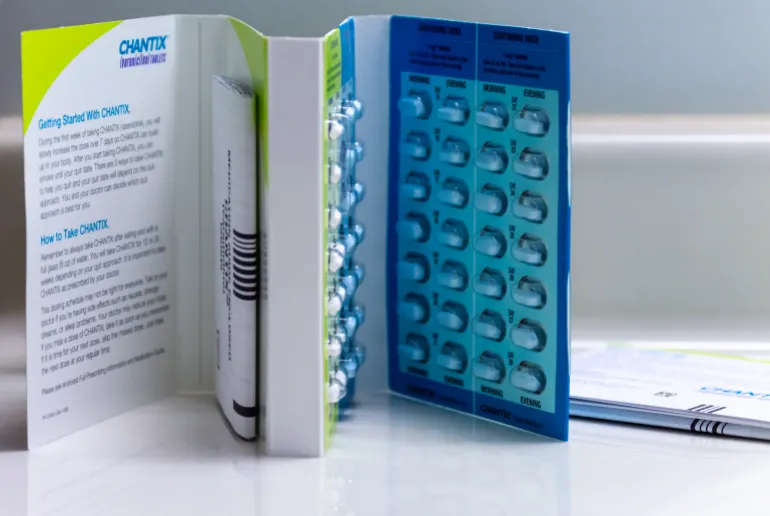The UK’s National Health Service (NHS) is rolling out a free antismoking pill called varenicline for British smokers. Research has shown that varenicline is more effective than traditional nicotine-replacement therapies such as gum or patches.
Approximately 85,000 smokers will be eligible to receive the antismoking medication which will be provided alongside “behavioural support” programmes aimed at helping people to quit smoking, the NHS announced earlier this week.
Research conducted by University College London suggests that it might prevent approximately 9,500 smoking-related deaths within the next five years.
“This simple daily pill could be a game-changer for people who want to quit smoking and is another vital step in shifting our NHS further towards prevention,” stated NHS chief executive Amanda Pritchard.
So, how does the new drug work and could it help to prevent serious, smoking-related diseases?
How many people smoke in the UK?
According to a 2023 Annual Population Survey of households conducted in the United Kingdom, roughly 11.9 percent of adults aged 18 years or over (around 6 million people) are current smokers.
The number of adult smokers by country within the UK are as follows:
England 11.6 percent
Wales 12.6 percent
Scotland 13.5 percent
Northern Ireland 13.3 percent
What is the drug the NHS plans to use?
This is a new version of an older drug called Champix. The new rollout is part of a wider UK initiative to decrease the number of smokers in the region and produce overall cost savings to the NHS.
In 2006, Champix, made by Pfizer, was the brand name for this antismoking medication in the UK market but it was withdrawn in October 2021 due to concerns about its content of nitrosamine, a known carcinogen.
Following the discovery of nitrosamine impurities in the drug, which exceeded acceptable limits established by the European Medicines Agency (EMA) and the Medicines and Healthcare products Regulatory Agency (MHRA), a recall was issued for community pharmacies and wholesalers.
In August 2024, the antismoking pill was re-introduced to the UK market as a generic antismoking medication called varenicline and was officially approved by the MHRA this month.
A Chantix pack blister card. Chantix, also called Champaix, a stop-smoking drug, was withdrawn in 2021 but has now been reintroduced to the market under the name varenicline, which will be available in the UK by prescription from a doctor [Shutterstock]
How does it work?
Varenicline works as a “nicotine receptor agonist”, a substance which activates a specific type of receptor in the brain. This agonist works in the same region of the brain as nicotine.
The drug decreases the effect that nicotine has on the brain while also reducing cravings and preventing withdrawal symptoms. This gives patients a controlled way to stimulate these receptors without actually using nicotine.
Professional clinicians recommend taking varenicline as part of a broader stop-smoking programme which would include education and counselling to assist the patient to give up smoking completely.
Clinicians recommend taking the antismoking pill for between 12 and 24 weeks to successfully eliminate nicotine cravings.
According to information provided by the NHS website, one to two tablets should taken daily, and smokers should start taking the tablets one or two weeks before they try to quit smoking.
The NHS also cites the following side effects:
Feeling and/or being sick
Difficulty sleeping (insomnia)
Vivid dreams sometimes
Dry mouth
Constipation or diarrhoea
Headaches
Feeling drowsy
Feeling dizzy
How is this drug expected to save the NHS money?
Smoking remains the lead cause of preventable illnesses and deaths in the UK, costing the NHS approximately 2.5 billion pounds ($3.17bn) annually to treat people with smoking-related health problems.
According to figures from the NHS, there were more than 400,000 hospital admissions in England during 2022-2023 which were directly linked to smoking-related issues.
A 2018 study by The National Institute for Health and Care Excellence (NICE) showed that for each one pound spent on the branded medication Champix, the previous antismoking pill which was prescribed to smokers in conjunction with behavioural support, 1.65 pounds was saved in the cost of treating smoking-related illnesses.
Where else is this drug being used?
According to a June 2023 report in the Lancet, the weekly peer-reviewed general medical journal, varenicline has been approved for use in 116 counties.
Although Champix (varenicline) had been approved in many countries, it has been largely unavailable since it was pulled from shelves in October 2021 around the world, including in the UK, EU, Japan, South America, and most of North America.
Champix was not re-introduced into the market as a generic antismoking pill, called varenicline, until this year.
What results has it had?
According to the Lancet, varenicline has been prescribed to more than 24 million smokers globally. Although clinical studies vary, between 14 percent and 50 percent of people successfully quit smoking, depending on the specific study and duration of the clinical trial.
However, most researchers agree on one point: Varenicline and other antismoking medications are the most effective ways to help people stop smoking.
Although many nicotine replacement therapy (NRT) options exist, including nicotine patches, nicotine gum and even nicotine sprays, which help people manage nicotine cravings and withdrawal symptoms when quitting smoking, options like varenicline have proven more effective. Studies of people who use nicotine-replacement products to give up smoking have produced very varied results. However, it is thought that only about 10 percent of smokers successfully give up smoking using this method alone.
What other antismoking drugs are available?
Varenicline is not the only antismoking pill available.
Cytisine, another smoking cessation drug similar to varenicline, is reported to be available in just 18 countries worldwide. It has not yet received approval from either the US Food and Drug Administration (FDA) or the EMA.
According to a December 2023 study by researchers in Argentina, led by Omar De Santi, toxicologist at the Posadas National Hospital in Buenos Aires, clinical trials have shown that cytisine pills were more than twice as likely to successfully help participants quit smoking compared with those taking a placebo.
“It could be very useful in reducing smoking in LAMI [low- and middle-income] countries where cost-effective smoking cessation drugs are urgently needed. Worldwide, smoking is considered the main cause of preventable death. Cytisine has the potential to be one of the big answers to that problem,” Santi told media in January following last year’s study.
How else is the UK government tackling smoking?
Last week, the UK government introduced the Tobacco and Vapes Bill, under which the legal age for buying tobacco products is set to rise incrementally over the next few years.
Under the bill, the minimum age for buying cigarettes will rise by one year annually, effectively prohibiting anyone born after January 1, 2009 – those aged 15 and under currently – from ever legally buying tobacco.
This “smoke-free generation” initiative, alongside the rollout of the new antismoking drug, could save taxpayers more than 500 million pounds ($633m) a year, according to Amanda Pritchard, NHS Chief Executive.
The government has dropped plans to ban smoking in pub gardens but is considering making it illegal to smoke in children’s playgrounds and outside schools and hospitals. However, the main focus of the updated Tobacco and Vapes Bill, to create a smoke-free UK generation by making it illegal for anyone currently aged 15 or under to ever buy cigarettes, will remain.
“Prevention is better than cure. The rollout of this pill can save the NHS millions of pounds, save appointments to help other patients be seen faster, and save lives,” Wes Streeting, Health and Social Care Secretary, told reporters this week.
How serious a problem is smoking to health around the world?
Since 2010, the World Health Organization (WHO) estimates that the annual global cost of tobacco-related illness is approximately $500bn each year.
Worldwide, 1·3 billion people use tobacco, which causes 8 million deaths each year from smoking-related illnesses. It is not just smokers who are affected. Some 13 million of these deaths a year occur in non-smokers who have been exposed to second-hand smoke.
Another 68 million people are estimated to use e-cigarettes
In 2021, WHO published The Global Investment Case for Tobacco Cessation study, which found, on average, that if countries spent $0.21 per person per year, an estimated 88 million individuals could potentially quit smoking by 2030.
In addition, a total of 9.3 million lives could potentially be saved among those who quit smoking before the age of 65.
Source: Al Jazeera






